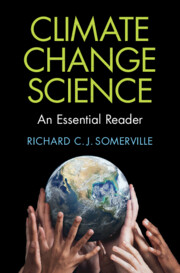Book contents
- Climate Change Science
- Reviews
- Climate Change Science
- Copyright page
- Dedication
- Epigraph
- Contents
- Preface
- Acknowledgments
- Part I Eight Articles from the Bulletin of the Atomic Scientists
- Part II Understanding and Communicating Climate Change Science
- 9 Preparation
- 10 Stories
- 11 Language
- 12 Solutions
- Part III Scientific Investigations of the Climate System
- Part IV The Future
- Appendix: Curriculum Vitae of Richard C. J. Somerville
- Glossary
- Resources: Recommended Websites and Books
- References
- Index
10 - Stories
from Part II - Understanding and Communicating Climate Change Science
Published online by Cambridge University Press: 13 November 2025
- Climate Change Science
- Reviews
- Climate Change Science
- Copyright page
- Dedication
- Epigraph
- Contents
- Preface
- Acknowledgments
- Part I Eight Articles from the Bulletin of the Atomic Scientists
- Part II Understanding and Communicating Climate Change Science
- 9 Preparation
- 10 Stories
- 11 Language
- 12 Solutions
- Part III Scientific Investigations of the Climate System
- Part IV The Future
- Appendix: Curriculum Vitae of Richard C. J. Somerville
- Glossary
- Resources: Recommended Websites and Books
- References
- Index
Summary
There are many parallels between climate change and medical topics. Some can be useful in educating people and politicians. It is frustratingly difficult to get people and their governments motivated to act to avert climate change. Yet people are intensely interested in threats to their own health. Many Americans have improved their health by making major changes that are directly attributable to the results of medical science. Real progress has been made in making Americans, and their government, more aware of unhealthy behavior. Medical science has achieved a measure of pervasive respect that climate science can only envy. Journalists covering a medical discovery do not mistrust researchers or insist on hearing from “the opposing view.” When reporting on research showing the need for Americans to eat more sensibly and be physically active, the media does not treat these advances in medical science in terms of a dispute. Journalists do not feel obliged to seek out medical contrarians “for balance.” Medical metaphors and parallels between the two fields (such as “prevention is better than cure”) can thus be powerful aids to communicating.
Keywords
Information
- Type
- Chapter
- Information
- Climate Change ScienceAn Essential Reader, pp. 59 - 65Publisher: Cambridge University PressPrint publication year: 2025
Accessibility standard: WCAG 2.0 A
Why this information is here
This section outlines the accessibility features of this content - including support for screen readers, full keyboard navigation and high-contrast display options. This may not be relevant for you.Accessibility Information
Content Navigation
Allows you to navigate directly to chapters, sections, or non‐text items through a linked table of contents, reducing the need for extensive scrolling.
Provides an interactive index, letting you go straight to where a term or subject appears in the text without manual searching.
Reading Order & Textual Equivalents
You will encounter all content (including footnotes, captions, etc.) in a clear, sequential flow, making it easier to follow with assistive tools like screen readers.
You get concise descriptions (for images, charts, or media clips), ensuring you do not miss crucial information when visual or audio elements are not accessible.
Structural and Technical Features
You gain clarity from ARIA (Accessible Rich Internet Applications) roles and attributes, as they help assistive technologies interpret how each part of the content functions.
